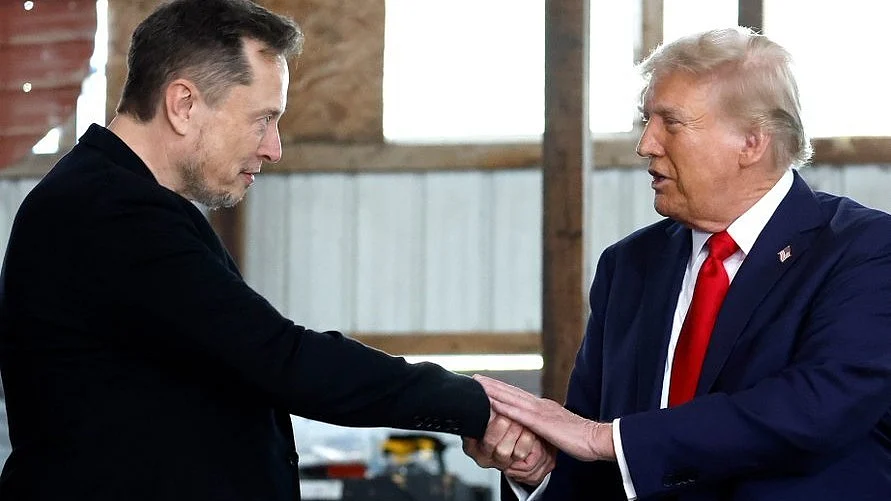Elon Musk says will cut back on political spending, feels he has 'done enough'
Decision comes mass exodus of US civil servants amid fears of termination under Trump administration

Elon Musk, the South African billionaire who is also the wealthiest person in the world and a key financial supporter of US President Donald Trump, said on Tuesday that he will be spending less on political campaigns.
His decision, which he disclosed via video conference during a Bloomberg forum in Doha, Qatar, could be a setback for Trump's Republican party before next year's midterm elections. It also speaks to Musk's possible disenchantment with politics after his tumultuous experience with the Department of Government Efficiency (DOGE), which Trump had created especially for him and which has fallen far short of its goals for reducing federal spending.
“I'm going to do a lot less in the future,” Musk said. Asked why, he responded that “I think I've done enough”.
Musk spent at least $250 million supporting Trump in the presidential campaign, as the main contributor to America PAC (political action committee), a super PAC that was active in advertising and contracting with door-to-door canvassing groups across the seven most-competitive states in the November 2024 presidential elections. Musk even headlined some of his own campaign rallies.
And while he took credit for helping Trump return to the White House, Musk, through America PAC, became deeply involved in a Wisconsin Supreme Court campaign in March this year.
The technology magnate contributed more than $21 million to America PAC and a related group, Rebuilding America's Future, in support of the Republican-backed candidate, who lost the seat on the state's high court.
Meanwhile, Reuters has reported that tens of thousands of US federal employees have opted to resign rather than endure what many perceive as a protracted and distressing wait for the Trump administration to act on its threats of dismissal, according to trade unions, public administration experts, and the workers themselves.
Upon assuming office, Trump had signed an executive order intended to significantly reduce the size and cost of the federal government, in a drive to be spearheaded by DOGE. However, four months later, widespread redundancies at major departments have yet to materialise, with judicial interventions further slowing the process.
Instead, the majority of the estimated 260,000 civil servants who have either departed or are expected to do so by the end of September have accepted severance packages or other incentives to voluntarily exit their roles. Several individuals informed Reuters that the continual stress of anticipating termination, following repeated warnings from administration officials, had become intolerable.
Consequently, Trump and Musk’s DOGE have succeeded in downsizing nearly 12 per cent of the approximately 2.3 million-strong civilian federal workforce primarily through the use of dismissal threats, financial inducements, and early retirement schemes, as shown by a Reuters analysis of departmental departures.
The White House declined to comment on this report. Both Trump and Musk have publicly asserted that the federal bureaucracy is excessively large, inefficient, and plagued by waste and corruption.
No official figures have yet been released by the White House detailing the total number of departures from the federal workforce. While it has confirmed that 75,000 employees accepted the first round of voluntary severance, it has not disclosed how many opted for the second round offered the previous month. Under the terms of the initiative, civil servants will continue receiving their full salaries and benefits until 30 September, with most exempt from further work obligations during this period.
Significant staff reductions have been earmarked for various departments, including over 80,000 positions at the Department of Veterans Affairs and 10,000 at the Department of Health and Human Services.
The Reuters report quotes Don Moynihan, Professor at the Ford School of Public Policy at the University of Michigan, as saying that a series of strategic initiatives from DOGE and the Trump administration have eroded early resistance among federal employees, effectively driving many to resign and thereby avoiding the legal complexities associated with forced dismissals.
These initiatives include an initial severance offer branding certain positions as "lower productivity" roles; a directive from Musk requiring staff to list five accomplishments from the previous week; and the reassignment of personnel to duties outside their areas of expertise. "It's inappropriate to think of these as voluntary resignations. Many of these employees feel that they were forced out," Moynihan told Reuters.
In the most comprehensive ruling to date, a federal judge in California on 9 May temporarily halted planned redundancies at 20 agencies, including the Departments of Agriculture, Health and Human Services, Treasury, and Veterans Affairs, ordering the reinstatement of employees already dismissed.
The administration is currently appealing the decision, which found that any restructuring of federal departments requires congressional approval.
While widespread redundancies at major agencies have not yet occurred, the administration may still pursue them in the coming months should the legal barriers be overturned on appeal.
With AP/PTI inputs
Follow us on: Facebook, Twitter, Google News, Instagram
Join our official telegram channel (@nationalherald) and stay updated with the latest headlines
